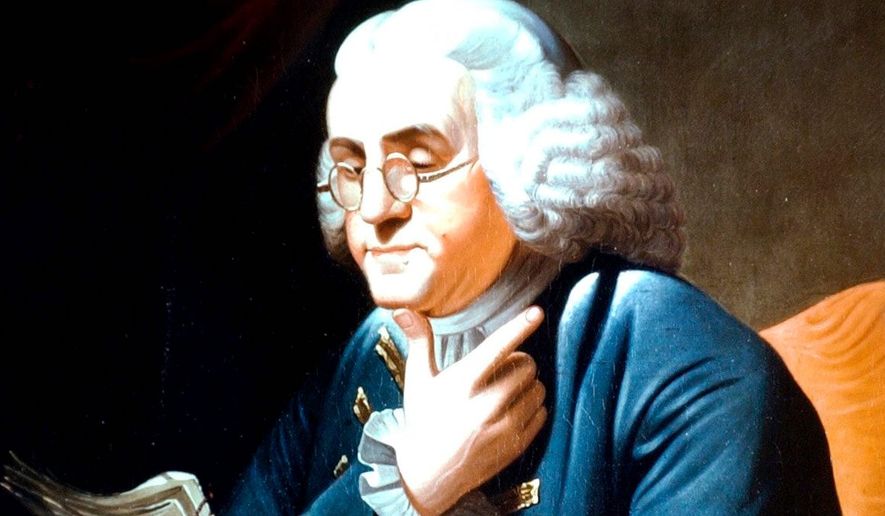OPINION:
Edward J. Larson has written a dual biography of Benjamin Franklin and George Washington called “Franklin & Washington: The Founding Partnership” (William Morrow).
“Their relationship gained historical significance during the American Revolution, when Franklin led the diplomatic mission in Europe and Washington commanded the Continental Army,” Mr. Larson writes in the book’s preface. “Victory required both of these efforts to succeed, and their success required coordination and cooperation.
“Their successful collaboration during the Revolution, especially when coupled with their role as two of most prominent delegates at the Constitution Convention, helped to found a nation and propel a global experiment with individual liberty and republican rule.”
Mr. Larson goes on to note that despite differences in their public images and private style, there are striking similarities. Both were successful businessmen and political leaders. Both commanded Colonial militias during the French and Indian War. Both were early supporters of independence. Both were leaders in the framing and ratification of the U.S. Constitution.
There was another similarity between the two that Mr. Larson did not cover in the book. From the British point of view, both Franklin and Washington committed the crime of espionage against the Crown. Franklin and Washington were America’s first spymasters.
As a founder of the Continental Congress’ Committee on Secret Correspondence, Franklin established an intelligence network in 1775. The committee conducted covert operations, devised codes, employed operatives, funded propaganda and established a courier system.
In an unclassified CIA historical document, Benjamin Franklin was called the “Father of American Covert Action.” The unsigned historical document noted that prior to the war, Franklin was a scientist of distinction, a seasoned diplomat, a world-class thinker, and a talented public servant.
“He utilized all of these skills to carry out covert actions successfully,” the document stated. “During the war, Franklin served as an agent of influence, a propagandist, a manager of covert French aid to the American Revolutionaries, and director of American paramilitary activities against the British.”
As the U.S. ambassador to France, he convinced the French to become a military ally against the British. He composed a forged letter from a Prussian prince to the commander of the prince’s mercenary troops. The bogus letter questioned casualty figures provided by the British and exposed British human rights violations committed against Americans. The forged letter also advised the commander to let his wounded soldiers die because the British would pay more for a death than for a wounded soldier.
Franklin was involved in paramilitary operations, including coordinating the efforts of privateers operating out of French and other European ports against British shipping.
In 1778, Capt. John Paul Jones raided the British port of Whitehaven. Franklin and Jones had planned to burn the ships at port, but once the attackers were ashore, the element of surprise was lost, and they were forced to retreat. Though the raid was unsuccessful, it aided America in terms of propaganda and morale.
“As a founding father, Benjamin Franklin understood that intelligence is as vital an element of national defense as a strong military,” the historical document stated. “He also knew the importance of secrecy for conducting effective intelligence operations. Franklin used his intellect and humor to win friendships and build French support for the American independence struggle.”
In another unclassified CIA historical document, George Washington was called the “First Director of Central Intelligence.” According to the document, he was a key practitioner of military intelligence during the Revolutionary War.
“General Washington was more deeply involved in intelligence operations than any American general-in-chief until Dwight Eisenhower during World War II,” the historical document noted. “His skills in the “black arts” helped secure key victories, hastened the end of hostilities, and significantly contributed to the United States’ winning its independence from Great Britain.”
Washington recruited and debriefed Tory and Patriot sources, developed espionage networks, interrogated prisoners and travelers, cleverly used deception and propaganda, and practiced sound tradecraft.
He spent more than 10 percent of his military funds on intelligence operations. Washington formed an elite detachment dedicated to tactical reconnaissance that reported directly to him. Washington also oversaw the Culper Ring in New York City and Long Island. (The Culper Ring was dramatized in the TV series “Turn.”)
The historical document stated that in 1778 Gen. Sir Henry Clinton occupied the city, while Washington’s forces were scattered around New York, New Jersey and Connecticut. Washington needed intelligence on Clinton’s forces and intentions, and he ordered Maj. Benjamin Tallmadge to establish an espionage net. Tallmadge’s operatives practiced sophisticated tradecraft that included code names, cover stories, secret writing, encryption and dead drops.
“Without General Washington’s intelligence-aided victories on the battlefield,” the historical document stated. “There would have been no independence, no United States, no Constitution, and no President Washington.”
• Paul Davis’ On Crime column covers true crime, crime fiction, mysteries and thrillers.




Please read our comment policy before commenting.